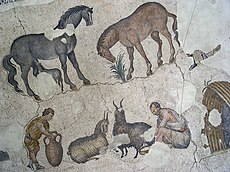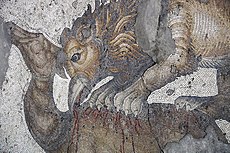Great Palace Mosaic Museum

The Great Palace Mosaic Museum (Turkish: Büyük Saray Mozaikleri Müzesi), is located close to Sultanahmet Square in Istanbul, Turkey, at Arasta Bazaar. The museum houses mosaics from the Byzantine period, unearthed at the site of the Great Palace of Constantinople.
History[]
The museum hosts the mosaics used to decorate the pavement of a peristyle court, dating possibly to the reign of Byzantine emperor Justinian I (r. 527–565), although more recent analysis hints at a later date, possibly even the reign of Heraclius.[1] It was uncovered by British archaeologists from the University of St Andrews in Scotland during extensive excavations at the Arasta Bazaar in Sultan Ahmet Square in 1935–1938 and 1951–1954. The area formed part of the south-western Great Palace, and the excavations discovered a large peristyle courtyard, with a surface of 1872 m², entirely decorated with mosaics. It was at this point that the Austrian Academy of Sciences, supervised by Prof. Dr. Werner Jobst, undertook to study and preserve the famous palace mosaic and to carry out additional archeological examinations (1983–1997) within the scope of a cooperative project with the Directorate General of Monuments and Museums in Turkey.
Gallery[]

Floor mosaic of a woman carrying a pot (c. 5th century)

Floor mosaic of a child and a donkey (c. 5th century)

Shepherds with animals

Elephant

Dromedary ride

Bear with prey

Boy and dog

Hunt scene

Decoration

Griffon attack

Arena play
See also[]
- List of museums and monuments in Istanbul
- Hippodrome of Constantinople
References[]
- ^ Bardill, Jonathan (2004). Brickstamps of Constantinople. Oxford University Press. ISBN 9780199255245.
External links[]
| Wikimedia Commons has media related to Great Palace Mosaic Museum. |
- Official website
- Byzantium 1200 | Mosaic Peristyle
- Istanbul Mosaic Museum Photos
- Some 220 pictures, so most of the scenes
Coordinates: 41°00′16″N 28°58′36″E / 41.00444°N 28.97667°E
- Byzantine mosaics
- Museums in Istanbul
- National museums in Turkey
- Byzantine museums in Turkey
- Great Palace of Constantinople
- Fatih











